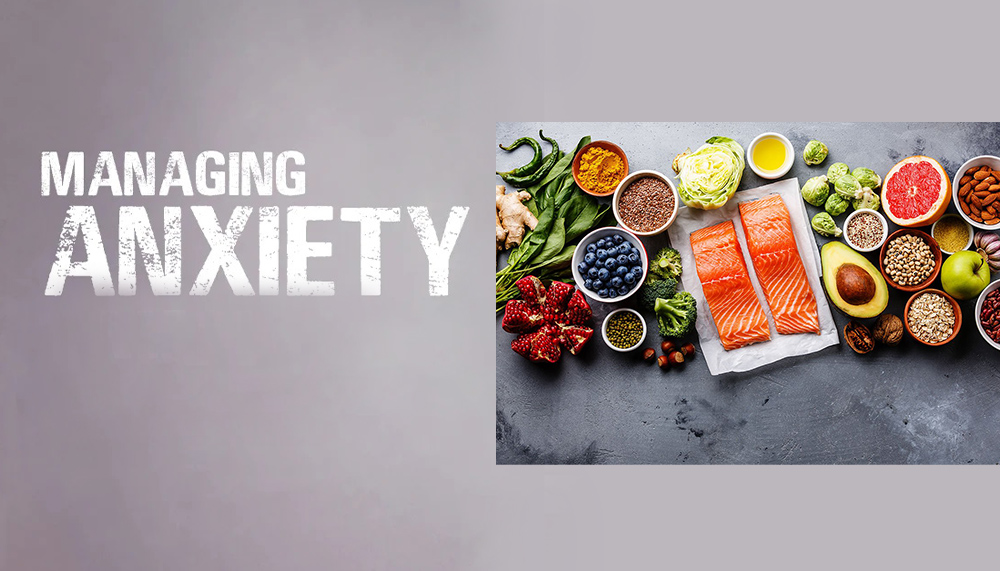Best Strategies for Managing Anxiety
Introduction
Anxiety is a widespread mental health issue that impacts millions of individuals globally. Although medicine and therapy are useful forms of treatment, there is growing evidence that dietary decisions can also have a major impact on anxiety management. There is growing research on the relationship between nutrition and mental health, and there are foods and dietary practices that can help reduce anxiety. We’ll look at a few dietary approaches to anxiety management in this post.
Balance Blood Sugar Levels
Blood sugar regulation is critical for general health and wellbeing. Blood sugar fluctuations can cause a number of health problems, such as diabetes and energy slumps. The following techniques can be used to assist regulate blood sugar levels:
- Choose Complex Carbohydrates:
Choose complex, whole carbs with a lower GI (glycemic index). Whole grains, legumes, and vegetables are examples of foods whose steady release of glucose helps to prevent sharp rises in blood sugar.
- Include Fiber-Rich Foods:
By reducing the rate at which sugar is absorbed, fiber aids to maintain stable blood sugar levels. Include whole grains, legumes, fruits, and vegetables in your diet.
- Balanced Meals:
Prepare meals that are well-balanced and contain a variety of healthy fats, proteins, and carbs. This combination offers long-lasting energy and aids with blood sugar regulation.
- Regular Meal Timing:
Consume consistent meals and snacks throughout the day to keep your energy levels steady. Meal skipping should be avoided since it might cause blood sugar abnormalities.
- Limit Added Sugars:
Reduce the amount of added-sugar meals and beverages you consume. Choose natural sweeteners sparingly, such as honey or maple syrup.
- Stay Hydrated:
Water is your best beverage throughout the day. Maintaining hydration is essential for general health since dehydration can impact blood sugar levels.
- Include Protein in Each Meal:
Protein increases feelings of fullness and aids in blood sugar stabilization. Make sure your meals contain lean protein sources including fish, chicken, tofu, and lentils.
- Regular Physical Activity:
Exercise on a regular basis to increase insulin sensitivity and facilitate your body’s efficient use of glucose. Blood sugar levels might benefit from even a little stroll.
- Manage Stress:
Blood sugar levels can be impacted by ongoing stress. Engage in stress-relieving practices like yoga, meditation, or deep breathing.
- Monitor Blood Sugar Levels:
Consider routinely checking your blood sugar levels if you are concerned about them. This can offer important information and help identify problems early on.
Increase Omega-3 Fatty Acids
- Fatty Fish:
Omega-3 fatty acids are abundant in fatty fish, such as trout, sardines, mackerel, and salmon. Try to eat these fish twice a week or more often in your diet.
- Flaxseeds:
One of the best organic forms of alpha-linolenic acid (ALA), a kind of omega-3 fatty acid, is flaxseeds and flaxseed oil. Mix ground flaxseeds into porridge, yogurt, and smoothies.
- Chia Seeds:
Another plant-based source of omega-3s is chia seeds. Chia seeds may be used to salads, yogurt, and your favorite meals.
- Walnuts:
A delicious and easy method to get more omega-3s is through walnuts. Eat a handful of walnuts as a snack or include them into baked dishes, cereal, and salads.
- Hemp Seeds:
Rich in omega-3 fatty acids, hemp seeds can be added to smoothies, yoghurt, and salads. Another way to include omega-3s into your diet is by using hemp oil.
Focus on Antioxidant-Rich Foods
Oxidative stress, which is linked to anxiety and other mental health problems, is fought off by antioxidants. Add a range of foods high in antioxidants to your diet, like:
- Berries (blueberries, strawberries, raspberries)
- Dark leafy greens (spinach, kale)
- Nuts and seeds
- Colorful fruits and vegetables
- Green tea
Also Read : https://diet2habit.com/food/citrus-vitamin-c/
Consume Probiotic-Rich Foods
Yogurt:
Select yogurt that is plain, unsweetened, and has live, active cultures. Probiotics may be found in abundance in traditional yogurt variants, including Greek yogurt.
Kefir:
A fermented dairy beverage called kefir has several different probiotic bacteria in it. Though it has a palatable consistency, it resembles yogurt.
Sauerkraut:
Fermented cabbage is called sauerkraut, and it has a lot of probiotics. To be sure your sauerkraut has living cultures, look for unpasteurized varieties.
Kimchi:
A classic Korean meal called kimchi is made with fermented vegetables, usually radishes and cabbage. It gives food an intense taste boost and is high in probiotics.
Miso:
Japanese miso is a condiment prepared from fermented rice, barley, or soybeans. It gives food a savory taste and is frequently used to make miso soup.
Managing Nicotine Use:
A stimulant present in tobacco products is nicotine. For both physical and emotional health, giving up smoking or taking nicotine replacement therapy might be helpful.
Stay Hydrated
Stress and anxiety levels might rise as a result of dehydration. To keep hydrated, make sure you consume enough water throughout the day. Herbal teas, such as those infused with lavender or chamomile, can also have a relaxing effect and provide a soothing substitute for coffee.
Consider Supplements
Supplements to the diet may help treat anxiety in some situations. Before beginning any supplementation, speak with a healthcare provider. They can advise you on the right dose and any possible drug interactions. Magnesium, B vitamins, and herbal medicines like ashwagandha and valerian root are common supplements for anxiety.
Conclusion
Nutrition can be a useful supplementary method for anxiety management, even if it cannot completely replace medical treatment. You might be able to better control your anxiety and enhance your general mental health by implementing these nutritional guidelines into your daily routine. Always keep in mind that every person will react differently to meals and supplements, so pay attention to your body’s signals and seek the counsel of a healthcare professional for specific recommendations.
For Latest News & Updates : https://indiansupdate.com/

